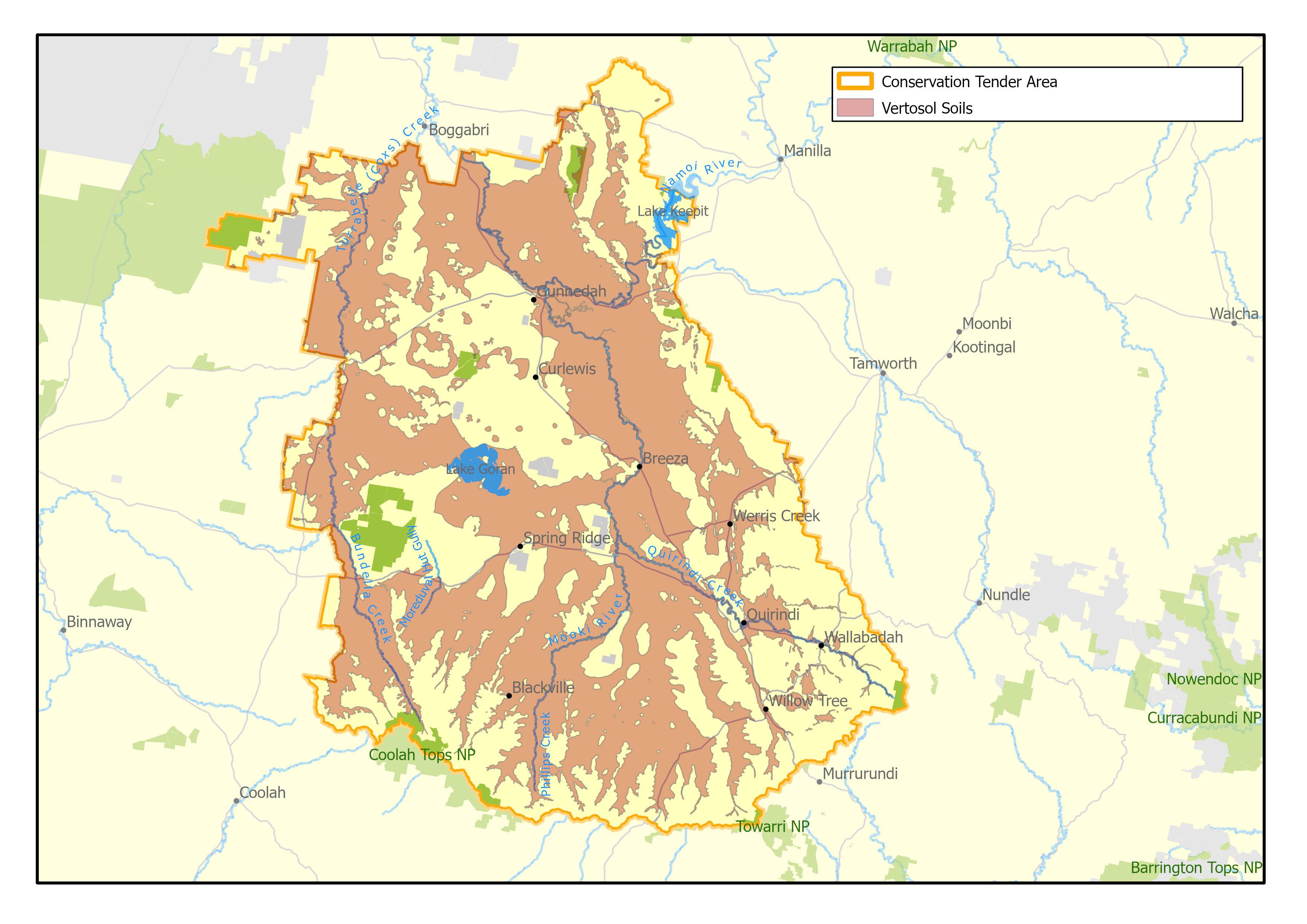
Expressions of Interest for this tender have now closed. Subscribe to our newsletter to receive advice of a tender opening.
Tender overview
The Liverpool Plains Cracking Clays conservation tender is your opportunity to set a price to protect and manage important native vegetation on your land.
If successful, you will receive annual payments to implement an agreed conservation management plan and enter into an in-perpetuity agreement with the NSW Biodiversity Conservation Trust.
Tender dates
July and August 2024: Information sessions held
22 July 2024: Expressions of interests opened
16 August 2024: Expressions of interest closed
Eligibility for a conservation agreement
The Liverpool Plains Cracking Clay conservation tender focuses on conserving remnant patches of moderate to good condition native vegetation on vertosol soils, with particular focus on natural grasslands and weeping myall woodlands Threatened Ecological Communities (TECs) as well as regionally significant wetland sedgelands. Other types of native vegetation, such as Floodplain and Grassy Woodlands and wetlands on vertosol soils, may be eligible.
To enter this tender you must be:
- an Owner of the land, as defined by the Biodiversity Conservation Act 2016 (NSW); and,
- an Australian citizen, registered for tax purposes in Australia and holding an Australian bank account, or an Australian registered company, registered for tax purposes in Australia, registered for GST and holding an Australian bank account; and,
- fit and proper persons to enter into a conservation agreement with the NSW Biodiversity Conservation Trust; and,
- willing to enter an in-perpetuity conservation agreement or a fixed term conservation agreement of minimum 15 years with the NSW Biodiversity Conservation Trust.
Eligible sites include those:
- within the proposed tender area.
- containing at least:
- one single patch of ≥ 5ha of a targeted community; natural grasslands, or weeping Myall woodlands, or wetland sedge lands on vertosol soils or
- one single patch of ≥ 10ha of other eligible native vegetation on vertosol soils and
- areas of Group 1 and Group 2 native vegetation on vertosol soils must be in moderate to good condition and meet the Plant Community Type descriptions or associated TEC determinations (see Appendix B of the tender Landholder Guide)
For full participant and conservation site eligibility requirements, refer to the tender Landholder Guide.
Eligible landholders will be contacted for an on-property assessment and work with you to set a conservation area to protect under an agreement with the NSW Biodiversity Conservation Trust.
Tender map and vegetation types
Tender map
The following soil map is indicative only and eligible soils may occur outside the mapped areas. If you are unsure of the extent of eligible soils on your site, please proceed with your expression of interest and this will be reviewed during site assessment.
Vegetation types
While all native vegetation types are eligible under the tender, the tender will prioritise the following Threatened Ecological Communities (TECs):
- Native Vegetation on cracking clay soils of the Liverpool Plains
- Myall Woodland in the Darling Riverine Plains, Brigalow Belt South, Cobar Peneplain, Murray-Darling Depression, Riverina and NSW South Western Slopes bioregions
- White Box - Yellow Box - Blakely’s Red Gum Grassy Woodland and Derived Native Grassland
- Poplar Box Grassy Woodland on Alluvial Soils
- Fuzzy Box Woodland on Alluvial Soils of the South – Western Slopes, Darling Riverine Plains and Brigalow Belt South Bioregions
- Inland Grey Box Woodland in the Riverina, NSW South Western Slopes, Cobar Peneplain, Nandewar and Brigalow Belt Bioregions
The tender is also focusing on regionally significant vegetation (not clearly associated with a TECs) including wetland sedgelands and other wetland type vegetation as well as Belah woodlands that occur on vertosol soils.
Submit your interest
Expressions of Interest for this tender have now closed. Subscribe to our newsletter to receive advice of a tender opening.
Landholder guide
FAQs
Before you choose to express your interest in the Liverpool Plains Cracking Clay conservation tender, review our frequently asked questions.
Phone: 1300 992 688
Email: [email protected]
Office locations: Visit our regional map
